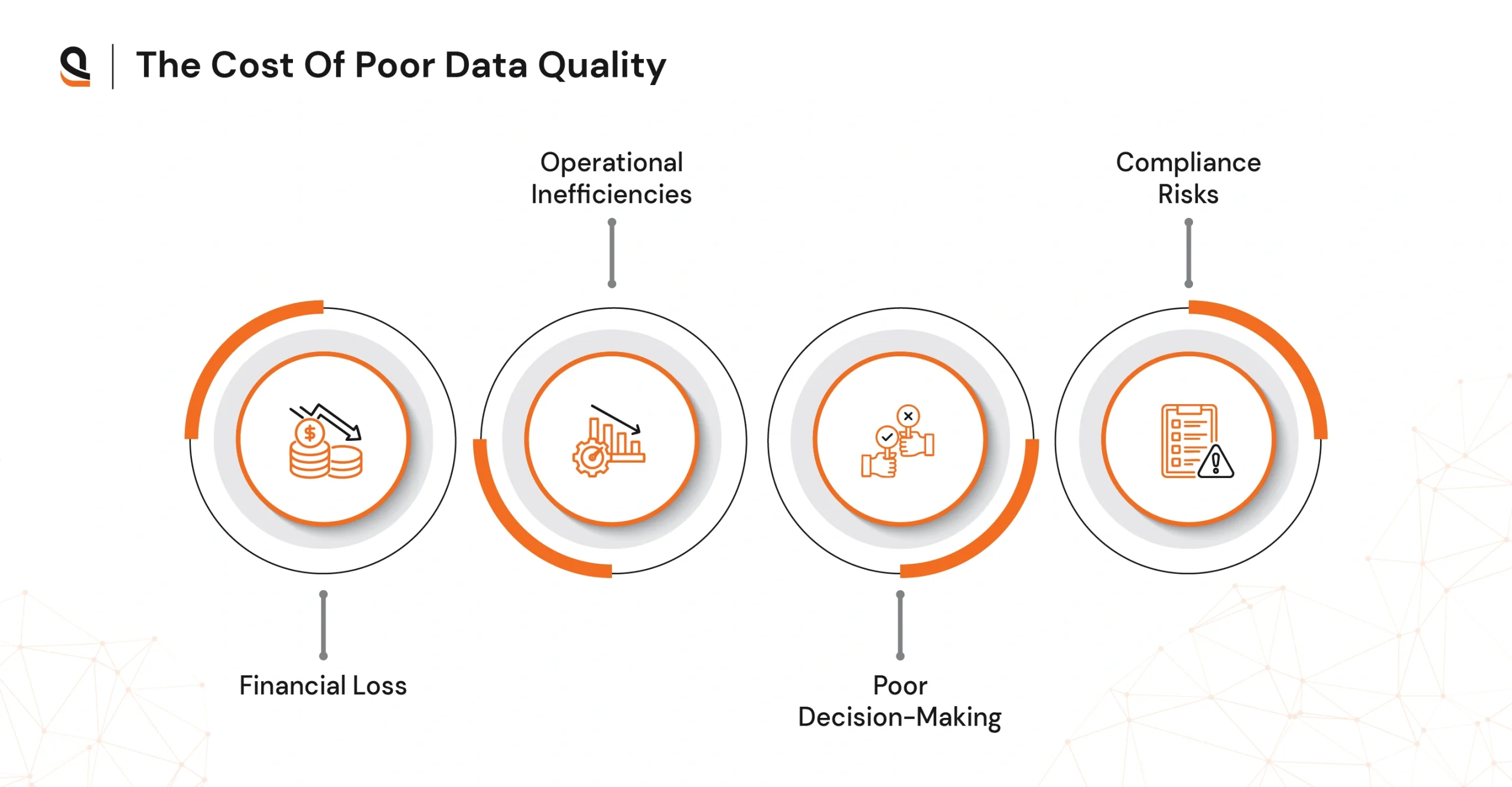
The challenge of poor data quality is not limited to any particular industry or sector it is a widespread issue affecting organizations of all sizes. The bad quality data includes data that is inconsistent, outdated, duplicated, or incomplete. Such data doesn’t get attention until and unless it starts disrupting operations, leading to inefficiencies, inaccurate reporting, and missed business opportunities. Poor data quality impacts revenue, decision-making, operational efficiencies, growth, compliance, and customer experience.
At the core of this challenge is master data—the essential information about customers, suppliers, products, employees, and financials. When this data lacks consistency and accuracy, it weakens every business process that depends on it. Many organizations experience the effects of bad data quality without having a clear system in place to manage or prevent it.
One of the key issues is the growing gap between the data management capabilities that businesses need and the actual skills and tools available within their teams. Without strong enterprise data management, organizations face mounting costs related to inefficiencies, data silos, and unreliable insights.
The Real Cost of Poor Data Quality: More Than Just a Tech Issue
The cost of poor data quality is staggering. According to Gartner, on average, businesses lose $12.9 million annually due to poor data quality. This includes losses from:
- Missed revenue opportunities
- Ineffective marketing campaigns
- Inefficient operations
- Poor customer experiences
- Compliance fines
Here’s how bad data quality hits your bottom line:
1. Financial Loss
Having irrelevant and unreliable segmented data can lead to resource wastage and revenue loss. How? Such inaccurate data, if utilized by the sales or marketing team, can lead to following up with leads that are non-existent or duplicates, leads with outdated contact info, or targeting the wrong audience during marketing campaigns.
2. Operational Inefficiencies
Data inconsistency leads to operational disruptions and inefficiency, resulting in teams spending their time in data cleaning, verification, reconciliation, and re-entering the information to make it accurate as well as relevant.
3. Poor Decision-Making
C-suite decisions based on faulty data can lead to strategic misfires. One wrong metric can derail entire business plans. Relying on outdated data can lead to bad decision-making as market trends and requirements keep changing.
4. Compliance Risks
Poor data quality can result in a violation of data privacy regulations such as GDPR and HIPAA, leading businesses to the risk of legal actions or penalties. Inaccurate or improperly stored data puts you at risk.
Why Is Bad Data Quality So Common These Days?
You’d think with all the technology available, this wouldn’t be an issue, but bad data quality continues to adversely affect companies. Why?
- Data silos across departments
- Lack of standardization in data entry
- Poor integration between systems
- Outdated or legacy software
- No formal enterprise data management strategy
But there’s a solution to these challenges: investing in robust enterprise data services and professional data management services.
What Are Enterprise Data Services?
Enterprise data services refer to the centralized tools, platforms, and strategies that ensure your business data is consistent, clean, accessible, and actionable across your entire organization.
When powered by professional enterprise data solutions, these services give your organization the foundation it needs to compete in a digital-first economy.
We offer business data solutions that cover the entire life cycle of your data—from collection and integration to governance, analytics, and archiving. We tailor our data analytics services to address the unique requirements of businesses across multiple verticals.
The Symptoms of Poor Data Quality
Here’s a checklist to evaluate whether your company is suffering from bad data quality:
- Duplicate customer records
- Frequent manual data corrections
- Mismatched reports across departments
- Delayed analytics due to inconsistent data sources
- Unexplainable drops in sales or customer satisfaction
- Difficulty complying with data privacy regulations
The Hidden Operational Costs of Poor Data Management
Beyond the obvious financial impact, poor data quality creates hidden and deeper effects throughout your business.
1. Customer Churn
Sending promotional emails to the wrong person or shipping a product to an outdated address are direct examples of poor data quality. Such mistakes affect your operational efficiencies, resource utilization capabilities, and revenue, as well as customer satisfaction and trust. If these mistakes are recurring, it can result in churn, making a long-term business loss.
2. Inefficient Workflows
When employees must spend hours locating, verifying, and correcting data manually, productivity drops. Missed deadlines, incorrect reporting, and internal miscommunication all trace back to bad data quality. Over time, this results in bloated staffing costs and stalled innovation.
3. Data Duplication
Duplicate records and unused datasets inflate your storage infrastructure and licensing fees, especially in cloud environments. Companies using SaaS platforms or data warehouses often unknowingly pay 20–30% more due to duplicate data. Addressing this with proper enterprise data services can reclaim significant resources.
4. Slow Decision-Making
Accurate data is essential for businesses to have a quick and strategic decision-making process. If reported with poor data quality, businesses can make wrong decisions and act late, resulting in missed market opportunities.
5. Supply Chain Inefficiencies
For efficient supply chain management, the basic need is accurate supplier information, inventory data, and shipping records- inaccuracy in these data can disrupt the entire supply chain. Such disruption results in increased costs, delayed fulfillment, and damaged customer relationships.
6. Compliance and Legal Exposure
Poor or incomplete data quality can result in non-compliance with major regulations like GDPR, HIPAA Security Rule, CCPA, or SOX. Damage to brand reputation, penalties, and lawsuits are some of the most devastating costs of poor data quality. Our data management services ensure your records are secure, traceable, and compliant.
7. Misaligned Sales and Marketing Campaigns
Accurate and properly segmented data is crucial for sales and marketing teams to target leads and get engaged with them. Relying on bad data quality can result in wasted campaigns, poor conversion rates, and unimpressive ROI. Optimized business data solutions can help businesses make their campaigns smarter, effective, and more personalized.
8. Employee Frustration
Employees struggling with unreliable systems and data fatigue are more likely to leave. Retaining skilled talent becomes harder when enterprise data management is overlooked, leading to increased HR and training costs.
Fix Poor Data Quality with the Right Enterprise Data Services
1. Data Auditing & Discovery
The first step in tackling the cost of poor data quality is understanding where the issues lie. Through comprehensive data audits, we evaluate every source of information across your business—from CRMs and ERPs to legacy databases and third-party feeds. This discovery phase helps identify:
- Redundant and duplicate entries
- Inconsistent formatting
- Incomplete or outdated records
- Siloed data affecting workflow
This foundation sets the stage for structured enterprise data management.
2. Data Cleansing & Standardization
Next, our data management services use AI-powered tools and human oversight to clean your existing data. This includes:
- Merging duplicates
- Correcting misspellings and misclassifications
- Filling missing fields using contextual inference
- Conforming entries to standardized formats
Clean, standardized data is the lifeblood of your enterprise data solutions, ensuring your analytics and reporting are trustworthy and accurate.
3. Data Integration & Centralization
Disconnected systems are a key reason for poor data quality. Our enterprise data services integrate your data into a centralized architecture. Whether you’re using cloud platforms, on-premise databases, or a hybrid model, our business data solutions ensure seamless synchronization. Benefits include:
- A single source of truth across departments
- Real-time data availability
- Enhanced cross-functional collaboration
This step alone can dramatically reduce the cost of poor data quality by eliminating miscommunication and reporting inconsistencies.
4. Data Governance Frameworks
We implement the listed robust enterprise data management governance protocols to ensure that data is clean as well as usable.
- Role-based access control
- Approval workflows for sensitive data changes
- Policies for data creation, modification, and deletion
- Audit trails for compliance
A robust governance model helps fix bad data quality and prevents it from recurring.
5. Automated Data Monitoring and Quality Scoring
Using intelligent algorithms and machine learning, our enterprise data solutions offer ongoing health checks for your data. Dashboards provide real-time insights into:
- Data freshness and completeness
- Anomaly detection
- System integration failures
- User behavior patterns indicating data misuse
This continuous oversight drastically reduces the cost of poor data quality over time.
6. Master Data Management (MDM)
MDM is a cornerstone of our enterprise data services. By defining and managing the critical entities of your business (such as customers, vendors, products, etc.), MDM ensures that all departments refer to the same set of core data. Benefits include:
- Reduced redundancy
- Higher data trust
- More effective business data solutions for analytics and reporting
MDM improves the reliability of every decision made within your enterprise by minimizing the cost of poor data quality at its root.
7. Metadata Management
Metadata management (data about your data) helps organizations better understand data origin, transformation, usage, and ownership.
To achieve clarity and support long-term enterprise data management initiatives, we include advanced tools and well-planned strategies in our data management services.
- Track data lineage for compliance
- Simplify discovery and analysis
- Improve collaboration between data users
8. AI-Driven Predictive Analytics for Data Quality
Using AI models, we not only identify bad data quality but also predict where quality issues are likely to arise. Our enterprise data solutions leverage these insights to automate preventative measures, such as real-time validations or data enrichment from third-party APIs.
This proactive strategy enhances the value of your business data solutions, ensuring that your data ecosystem evolves in a healthy, scalable direction.
Business Impact of Enterprise Data Management
When companies invest in strong enterprise data management, the transformation is powerful:
- 15% increase in campaign ROI due to accurate targeting
- 2X faster reporting times
- 50% reduction in manual data entry tasks
- 20% improvement in customer retention
We’ve helped dozens of clients achieve results like these through our tailored business data solutions and enterprise data services.
Why Choose Us for Your Data Management Services?
Here’s what makes our enterprise data services stand out:
- End-to-End Services: From concept to execution, we manage everything
- Industry-Specific Solutions: Tailored business data solutions for retail, finance, healthcare, and more
- Scalable Platforms: Future-proof your systems as your data grows
- Compliance-Ready: Ensure full adherence to GDPR, HIPAA, and other regulations
- 24/7 Support: Ongoing optimization and troubleshooting
Future-Proof Your Business with Enterprise Data Solutions
Clean, interconnected, and correct data has the potential to become the most valuable asset for businesses. Having advanced enterprise data services on board can give you a competitive advantage.
To make the most out of your data, embrace proactive enterprise data management to:
- Make smarter decisions
- Deliver better customer experiences
- Reduce compliance risks
- Boost operational efficiency
Final Thoughts
The cost of poor data quality isn’t just a technical inconvenience—it’s a silent business killer. But the good news? It’s completely avoidable. With the right enterprise data services and a team of experts capable of unlocking the power of data, you can transform your organization from the inside out. Let us help you fix your data problems—before they become business problems. Get in touch with us today to schedule a free data health check.




